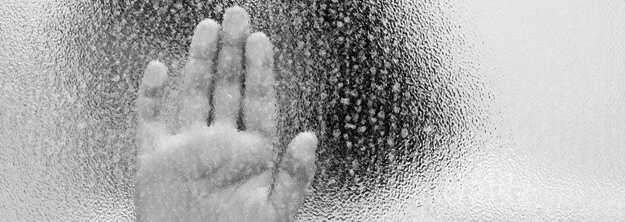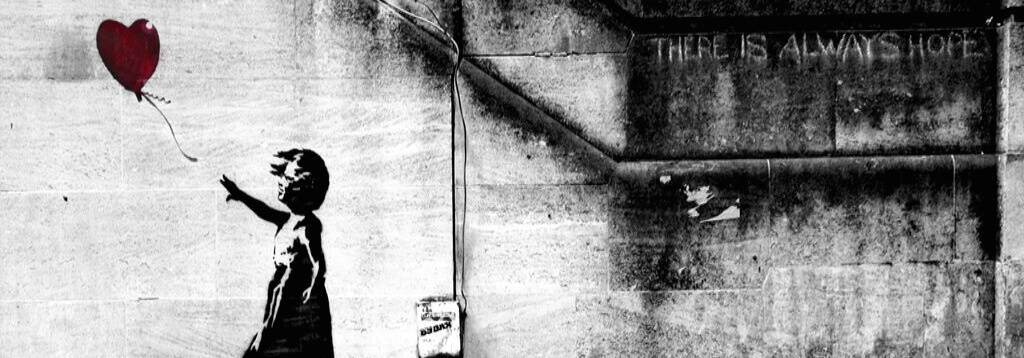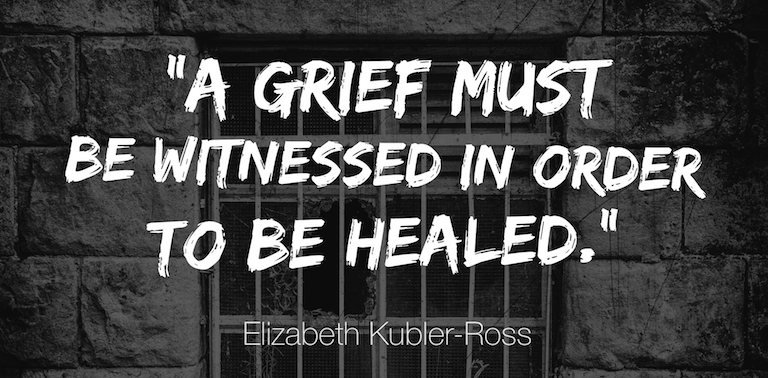I was twenty-seven before someone told me I was a victim.
I was twenty-seven before I was able to face the turmoil created by too many unspoken traumas. Twenty-seven before I realized the power I was giving my perpetrators by keeping their crime silent. Twenty-seven before I spoke it. Just spoke it.
The liberation of that moment was life-transforming, and since then, one of the foremost goals of my existence has been to encourage others to speak it—just speak it—before their years of bondage become hobbling, as mine did.
The first assault on my innocence came at the hands of a stranger, when I was just 4 or 5 years old and separated from my parents in a vast French supermarket. I’d like to qualify the episode as “minor,” yet there is no such thing as minor when a childhood is being crippled and stained.
But my parents had moved to France to save the unsaved. It seemed wrong, somehow, to accuse one of those “lost souls” of causing such grievous harm.
The second assault came several years later, this time at the hands of a fellow Missionary Kid. I was maybe 9 or 10 at the time. He was much older. It was a carefully crafted and manipulative incident that felt harmless until after it was over.
Add to that an abusive first “boyfriend,” repeated emotional assaults from several fronts and the dehumanization of women in the sex-saturated French culture, and I think it’s safe to say that my victimhood was neatly tied up before I started college. Tied up in a noose, perhaps, as the memories and the pain, the silence and the guilt were constrictive, invisible coils snuffing hope and wholeness from my life.

It wasn’t until my mid-twenties that I finally allowed myself to wade into the toxic waste of the emotional, relational and spiritual devastation those childhood events had caused—twenty-some years marred by self-accusation, misplaced shame and a mute resignation.
I told myself that even if I did speak, no one would ever understand. No one would know what to do with sullied-me. For a child who already suffered from paralyzing low self-esteem, giving the world one more reason to consider me inferior was an untenable notion.
It’s that fear of unbelief, that fear of condemnation, that keeps most victims silent.
In missionary circles, it is compounded by the pressure to be perfect, or else… MKs who have been hurt often fear that an admission of violation would result in banishment back to a “home” country that is foreign to them. They fear that what was done to them will have a devastating impact on their parents and their ministry. A lot of times, all they really know of supporting churches is that they expect their missionaries to be paragons of virtue, and in the twisted logic of the victim, revealing the truth would shatter that illusion.
So they stay silent. As I stayed silent. How sad that the consequences of another’s sin sometimes burn the victim more severely than the perpetrator. But healing…healing can be ours if we’ll just speak it. Until we do, the abuser’s sin wins.

“Although the world is full of suffering, it is also full of overcoming it.”
Helen Keller
In the fall of 2010, I heard Dr. Andrew Schmutzer address a local church on the topic of sexual abuse. He took a CD and a knife from his pocket, then carved his initials into the bottom side of the disc. The CD still looked shiny. It appeared perfectly circular and flat—pristine. But imagine trying to play it.
It’s true—MKs are resilient people. We tend to carefully compartmentalize our worlds and sometimes manage to “live around” our trauma.
It’s as if our CDs have multiple tracks, and we make sure the initials carved by the knife of sexual abuse only cover one or two of them.
If we can just figure out a way to live on the other tracks—the unmarred tracks—everything will be okay. No one will know. We won’t have to deal with the residual poison of our assaults and life will proceed as if they never happened.
All lies.
Because at some point in our existence, something will make that CD player jump to that horrifying track where the shaking, shamed, broken and inconsolable child we used to be still breathes, still begs for help, still agonizes…
And whether we like it or not, whether we think we can control it or not, that mute track in the middle of our lives is hobbling our relationships, our ambitions and our ability to live as a healed and whole person.
If you have been or are being sexually, verbally or physically abused, please—I beg of you—speak it.
Even if what happened to you seems insignificant in comparison with what others have suffered, if someone was sexually inappropriate with you in any way, speak it.
Tell your pastor. Tell your friend. Tell your small group leader. Tell your neighbor. If you need to take someone with you, that’s fine too. If you don’t feel comfortable saying the words out loud, write them on a piece of paper and hand it to the person you trust.
Just please…speak it—and if those who hear you do nothing to help you, find someone else and speak it again.
As soon as it is spoken—as soon as it is spoken—your healing will be able to begin.
I know it. I’ve experienced it. You may need to try and try again until you find the right kind of help, and sometimes it will have to get painful again before it gets any better. But that will be a hopeful kind of pain, not the hopeless turmoil you’ve lived with alone for so long.

And if you think it’s safe to ignore those CD “tracks” of your life—they’re safely on mute and don’t affect you anymore—I urge you to reconsider. The adult victim of sexual abuse is multiple times more prone to depression, adultery, pornography, drug use, alienation from loved ones, the inability to have healthy relationships, spiritual paralysis and becoming an abuser.
You may think that you’re living well despite the time-cauterized wounds of your past, but if you’re honest with yourself, you may find those wounds connected to the challenges and failures of your life in the present.
Speak it to someone who will know what to do with it—the rest of your life depends on it.
Is there hope for even the most grievously wounded among us? Yes. Is there joy, fulfillment and peace? Absolutely. I know it’s hard to see from the vantage point of unhealed grief, but trust this recovering victim:
Life beyond the pain and shame is beautiful and bright.
It may take more than one try to find someone who will listen and help. It may take some therapy for you to feel strong again. It may take more courage than you think you possess. Whatever it requires of you, begin your journey now. The outcome will be so worth it.
Your future is waiting. Dream it. Shape it. Expect it. Live it. It all begins with the strength and resolve to reach out to someone right now and…speak it.
~~~~~~~
A note for missionary parents:
If you’re parenting MKs, this companion article may be useful in helping to prevent and recognize sexual abuse. Click HERE.
A note for abusers:
If you’re the perpetrator—and this is not easy for a victim like me to say—if you’ve abused or are abusing someone, you are just as entitled to help as the person you’ve victimized. We’re dealing with God here, and His love for the abuser is beyond human understanding.
You will continue to bear full responsibility for what you’ve done and for its consequences, but that doesn’t make you any less worthy of God’s forgiveness. For the sake of your future and to stop the destruction you’re wreaking on the lives you touch, speak it. It won’t undo the damage of the crimes you’ve committed, but it will restore you to fellowship with the only One who can possibly fully forgive and love you.
PLEASE REPOST THIS ARTICLE TO ENSURE THAT AS MANY MKs AS POSSIBLE CAN BE ENCOURAGED TO BRING THEIR OWN PLIGHT TO LIGHT AND FIND HEALING.
Please join the conversation!
- Contribute your thoughts in the comments section below
- Use the social media links to Like and Share this article
- Many of these articles are now available in podcast form. Simply search for “Pondering Purple” on your usual pod platforms, or click this link to be taken to its host page.
- To subscribe to this blog, email michelesblog@gmail.com and write “subscribe” in the subject line
- Pick up Of Stillness and Storm (my novel about a missionary calling gone awry) on Amazon




sally phoenix
I am so sorry that I didn’t know about that part of your painful growing up years until much later. I grew up believing that abuse could never happen to missionaries children (nor that infidelity or addiction could EVER exist in the mission community).
What signs can missionary parents look for in their children that indicate that abuse is going on and what guidelines can you suggest in helping the child recover and heal?
michele
That’s a big question, one I encourage other readers to answer from their own point of view as well. My thoughts:
1. Foster a relationship with your children that allows for honest communication on all topics. It’s hard to talk about sexual abuse if you can’t talk about sex and sexual organs.
2. Make your priorities clear. Your children need to grow up with the firm conviction that they are more important to you than your ministry. Sadly, the opposite is often expressed in verbal and non-verbal ways. MKs often sacrifice themselves to ensure that their parents’ ministry isn’t harmed, because they’re convinced their welfare is less important to their parents than the work they’re involved in. So very sad.
3. Enlist someone outside the family (maybe even outside the ministry) to be an adult sounding board for your children…on a regular basis. Nurture that one-on-one relationship between them. MKs will sometimes admit to an “outsider” what they’d never mention to their own family members.
4. Ask questions. Then ask questions again. Particularly in cultures where inappropriate behavior is common, MKs might not even think of reporting back, because what happens to them is considered “normal” where they live. I can think of several instances when I laughed off something that happened because my friends were laughing about it too…but it left an imprint on me. Make sure your children know what is and isn’t acceptable, then ask them often about the way they’ve been treated. Note that verbal and emotional abuse are common on the mission field too. Make sure they’re included in your regular check-ins.
5. Acknowledge that we live in a twisted world and that bad things (very bad things) even happen to children whose parents serve God. To some degree, I think that actually makes them a more highly prized target to the perpetrators of evil! If you bury your head in the sand, you’re burying your child’s head too. There are several instances I’ve heard of and witnessed when parents knew that something horrible had happened, but refused to make it public because it might make things messy–damage their ministry, complicate relationships, be misunderstood by supporting churches, require that they stop “serving God” to care for their injured family member. (Atrocious rationalizations, I know.) Being silent doesn’t make the pain or the consequences of abuse just go away. It allows both to fester and invariably to be even more devastating over time.
In all cases, if you suspect abuse, ask questions until you’re sure (in your gut and soul) that you’ve gotten honest answers. If you witness abuse, immediately (IMMEDIATELY) take action. Report it to those who can do something about it, and if they don’t, move up the chain of authority until someone does. Enlist others you trust to help you.
6. Look behind your own closed doors. I’ve seen missionary mothers and fathers causing irreparable harm to their children. I’ve seen the “other spouse” turn a blind eye to it or excuse it with lame murmurs of “he’s under a lot of stress” or “give her some time–it’ll get better.” I’ve seen wives doing nothing when their husbands have poured out their anger on their children. I’ve seen husbands merely spend more time at the office or on the road when their wives made their home a toxic environment. Oh, how I’d love to see adults in ministry sacrificing their own comfort, their own image, their own status quo instead of sacrificing their CHILDREN to preserve those.
If your child is being harmed at home in any way, be honest, get help, move your child to safety and, yes, speak it. Be courageous enough to admit your own failures, risk being misunderstood, face tough decisions, be okay with dirty laundry aired for the sake of honesty, and commit to sacrificing life-as-you-know-it for the safety and welfare of the children God gave you. After all, that is exactly what He did for you.
7. GET HELP. The repercussions of child abuse are never a do-it-yourself project. If lasting and complete healing is to be found, the involvement of a person or persons trained in counseling the victims of abuse AND their families is absolutely essential. If the first person you try isn’t the best fit, find another. Be relentless in your family’s pursuit of wholeness, willing to sacrifice the temporal in order to gain the eternal. Child abuse is a crime that can hobble for generations. Let nothing come between your family and its chance for healing.
Elizabeth
Shame is a big effect of abuse. I think children may not show many outward signs, but often they will be ashamed, and it is evident. If kids become withdrawn, more silent, and less ‘sparky’ in general, or unwilling to speak much, it would be a good idea to check up on them.
sarah
I would add two things to the list above:
1. Believe your children. In my work, I have heard so many stories of parents who didn’t believe their children, oftentimes out of denial or fear. If your child says something is happening, something is happening. And if it turns out not to be true, then that is a separate issue.
2. Be preemptive in not casting blame. It is so important to remind people of the simple truth that this is not their fault. While you’re being honest with your kids about the dangers of the world, also let them know that should anything like this ever actually happen to them, it will not have been their fault.
shary
Added to the physical and sexual abuse is the spiritual abuse. Offenders in Christian communities use spiritual abuse to keep the victims in line. Threatening hell and God’s anger on children is a life long trauma. Even when I know how much God loves me and cares for me many times “you are worthless, you can’t do anything right” comes back. A dorm mother gave a talk on how evil dancing is and that those who dance go to hell. A few days later she told me I was so clumsy I needed to take dance lessons. Even as a child I knew she wanted me to go to hell. Over concern with making sure a child is saved by threatening God’s disapproval and going to hell will not save them, in fact may send them there.
Abuse on the mission field is very prevalent. Of the 200 that went to my school Mamou 175 suffered some kind of abuse. And don’t let people fool you policies against abuse have never stopped anyone just make them more careful not to get caught.
K-eM
Elizabeth is right. If a child acts ashamed, gets more quiet and reserved, check on them. Gently.
My 6th grade teacher would take us into the closet and “paddle” us if we didn’t do well on a test or quiz. I guess his reasoning was that he could beat good grades into us. Another time he humiliated a messy classmate by making him sit on the floor hemmed in by chairs and pouring the contents of his desk and the trashcan over his head.
When my grades went down my house father would call me to the little window through the wall from the hall into his office where I was interrogated about the state of my grades.
I didn’t say anything to my parents when I wrote letters or when I saw them over break because I didn’t want to worry them. I thought it was my fault so I stayed quiet and prayed for the brief oblivion of sleep every night, desperate to escape my fears about how I would screw up the next day.
I didn’t even admit that it was abuse until last year. That’s the thing…admitting it. When you admit it you can confront it in your own life and speak out for others. When I talk to missionaries I remind them that their first calling is to their children. The mission is second.
If an adult had gently taken me aside and asked specifically about the things that happened during the day, offering help, I would have told them. “What happens when you don’t do good on a quiz?” “I have to be paddled.” “Afo seems a little scatter brained. Does he have trouble in school?” “Yes, my teacher poured the trash over him once.” “Do you want some help so you can do better on your quizes?” “Yes.”
After the interrogator house parents left we got new ones. That house mom saw that something was wrong and gently asked questions that seemed innocent to me but told her much more than I knew. And she did help, sitting with me every night to teach me my math as my teacher would not. She also communicated her worries and how she was helping to my parents. I imagine she probably lodged a complaint with the school as well. That teacher left after only a year. She advocated for me and took care of me.
bs204204
I’m a 19 year old MK and to be totally honest, I’ve never felt truly connected with the MK community for several reasons. This article, however, made me feel more connected to it than ever before. I’ve only suffered a part of the abuse that you have but it makes me feel less alone to know that other people have gone through the same things that I have. Not only are MK’s silent to supporting churches and the mission field in general about our troubles, but we’re also silent to other MK’s. It’s terrible the amount of shame I (we) feel as an MK to not be perfect and to have been emotionally abused and now be dealing with the repercussions it.
Claudia
I did not grow up as an MK, but I did grow up in an immigrant family in Brazil. In many third world or developing countries, It is common for middle class families to hire “helpers” and “maids”. This was common back then, and it is still common now. And it concerns me greatly. I know many missionary families hire “helpers” and “maids” in the name of “ministering” to the community by way of giving these (usually) women jobs and a means to experience and see the testimony of a Christian family, but it could come with a price. Growing up in Brazil, my parents who worked hard, had no relatives around to help with their then three daughters, so we were looked after by maids. Our very first maid was only 19 years of age when she came to work and live with us, and my parents trusted her and she stayed with us for a good 5+years. Unfortunately, me and my sisters (all under 10 years of age) were victims to sexual abuse via exposure to pornography. This young women would watch pronography in our living room, in our presence; she’d bring and look at pornographic magazine in front of us; and she’d talk to us about her sex life with her “boyfriend”. I don’t remember ever telling our parents about it because we were never knew what it was, let alone that it was wrong! Moreover, we were constant victims of sexual abuse by young boys and man in the neighborhood who’d holler sexual comments and suggestions at us, sometimes even dare touch us in sexual manners in passing by complete strangers! Sexual abuse doesn’t only happen by way of physical act; it can also be through exposure to inappropriate sexual exposure and advances. I pray for the young children of missionary children in the care of “helpers” and “maids”, who themselves were probably victims and were never taught their behavior is wrong or highly inappropriate. 🙁
M B
Amongst the various categories of abuse you cite – sexual, verbal or physical – of course sexual is the worst/most damaging – set apart in a category of its own – & there have been a few ?notorious cases of this at MK schools coming to light in the years since.
But . . . what counts as verbal and physical _abuse_? When does the ‘normal’ (an ?”only-to-be-expected” part of growing up) rough-&-tumble of play-ground life go too far? Does it include (what counts as?) bullying – physical or psychological – as abuse?
Bullying _is_ an issue the world over – not special to the MK context – and it has been written about e.g. see https://www.jodeeblanco.com . . .
Witness the ‘over-sensitivity’ trouble on some college campuses in the USA in these days (‘trigger-word’ ?health warnings required to arguably a ?thin-skinned generation that has been too ?molly-coddled in their own time, to be able to cope with the big, often bad, real world). . .
Mary
What can be done for a survivor who has already “spoken” and had counseling yet is still spiritually paralyzed? How can they recover from this when it was Christians who abused them?
michele
Thank you for this question, Mary. I know people who are exactly as you describe–still paralyzed despite having sought help for what they endured. I’ll write to you privately later today, but my general comment in this public forum is to continue seeking different kinds of help until you feel that you’ve truly found stability/healing again. More in my private note to you.
[BLOCKED BY STBV] EIGHT CRUCIAL STEPS: Preventing and Recognizing MK Abuse |
[…] two years ago, I wrote an article titled Child Abuse on the Mission Field that garnered significant attention. This is a follow-up post providing parents with concrete steps […]
[BLOCKED BY STBV] ANXIETY – Shedding Daylight on the Stigma |
[…] Then again—if you’ve read any of my writing, you know that I don’t shy away from topics like sexual abuse, mission-damaged faith and even […]